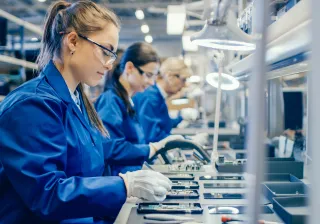High potential for climate change mitigation actions are related to process industry decarbonisation and transportation. Fossil-based fuels need to be replaced with sustainable alternatives. However, there is no single renewable feedstock conversion route to replace the fossil-based production. Therefore, Synjet project has been established to widen the future possibilities with two promising routes to convert a variety of renewable feedstocks into aviation fuels and, for example, rubber and ingredients to cosmetics.
The joint project combines the efforts of three research partners, University of Jyväskylä, VTT and Åbo Akademi, and multiple commercial partners. The target is to seek solutions for increasing the conversion efficiency and profitability from sustainable feedstocks to valuable products. Especially, climate change mitigation actions require tangible research actions to fulfil targets in transportation sectors, which might be difficult to electrify. The primary target is aviation fuels; however, many other chemical industry products can be synthesized with the studied routes.
“Together with Synjet research partners and companies, we have established a consortium with multidisciplinary know-how from several chemical industry sectors from fuel refining to rubber products and cosmetics. The consortium support and feedback give us a great foothold to promote also VTT’s expertise in sustainable catalytic synthesis routes to fuels and chemicals. This development has a pivotal role to reach the national carbon emission reduction targets”, explains VTT’s Research professor Juha Lehtonen.
Why we need different routes to sustainable and renewable fuels?
The sustainable aviation fuels are needed to reach stringent GHG emission goals. To answer this demand, selective conversion routes are needed for abundant and versatile renewable feedstock supply. When it comes to producing fossil-based fuels, the production routes are somewhat straightforward and similar with no need for multiple different routes. Renewable raw materials, in turn, originate from a very wide range of feedstock (wood, food waste, municipal waste, carbon dioxide) and one route cannot be used for all these resources.
In order to replace fossil-based hydrocarbon products, a wide selection of production routes has to be studied and commercialized. Synjet project will tackle these matters with two promising production routes, fatty alcohol and isosynthesis routes, to increase selectivity towards the required fuel and chemical intermediates.
"Neste is looking forward to develop and assess new conversion routes from syngas to new green reactive intermediates. New opportunities are being constantly scouted and benchmarked against previously assessed ones. Creation of a collaboration ecosystem between research institutes and companies is regarded as very valuable as well", says Jaana Kanervo, Senior Associate at Neste.
More about the project
Synjet is a 2-year project (1.1.2022 – 31.12.2023) having a substantial 1.94M€ funding from Business Finland. A joint project has been established through Business Finland Co-Innovation funding having three research partners University of Jyväskylä, VTT Technical Research Centre of Finland and Åbo Akademi. The project has strong support from multiple commercial partners, such as Neste, Sumitomo, Helen, Kanteleen voima, Kleener, Nokian renkaat, P2X solutions, Berner, Ravelast Polymers and Andritz. Furthermore, the project has a link to Neste Veturi Programme funded by Business Finland as well.
Additional information
Neste
Senior Associate Jaana Kanervo, [email protected]
VTT Technical Research Centre of Finland Ltd. (Work related to isosynthesis)
Research professor Juha Lehtonen, [email protected]
Research Scientist Niko Heikkinen, [email protected]
University of Jyväskylä (Work related to computational chemistry)
Professor Karoliina Honkala, [email protected]
Åbo Akademi (Work related to fatty alcohol route)
Professor Dmitry Murzin, [email protected]








